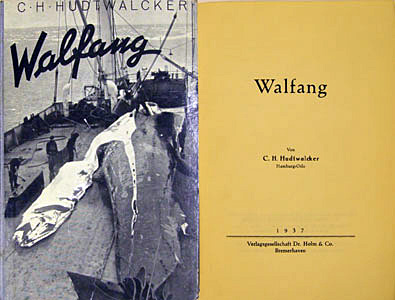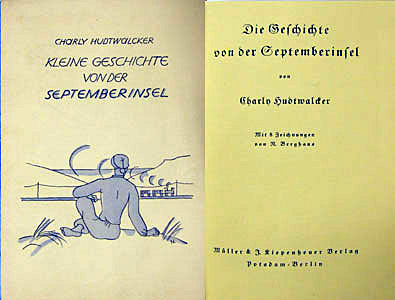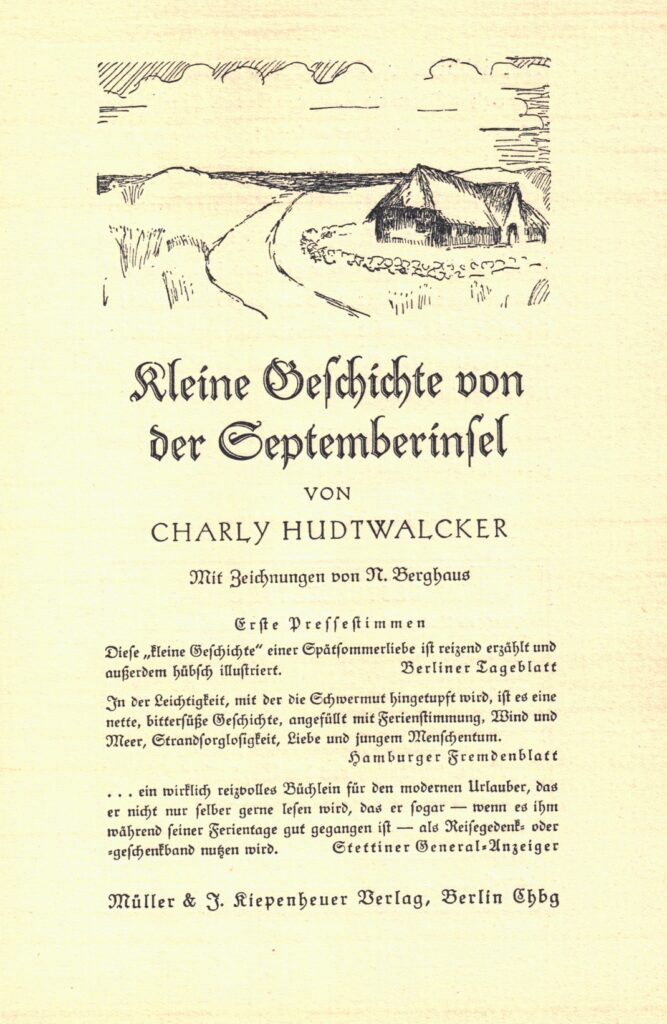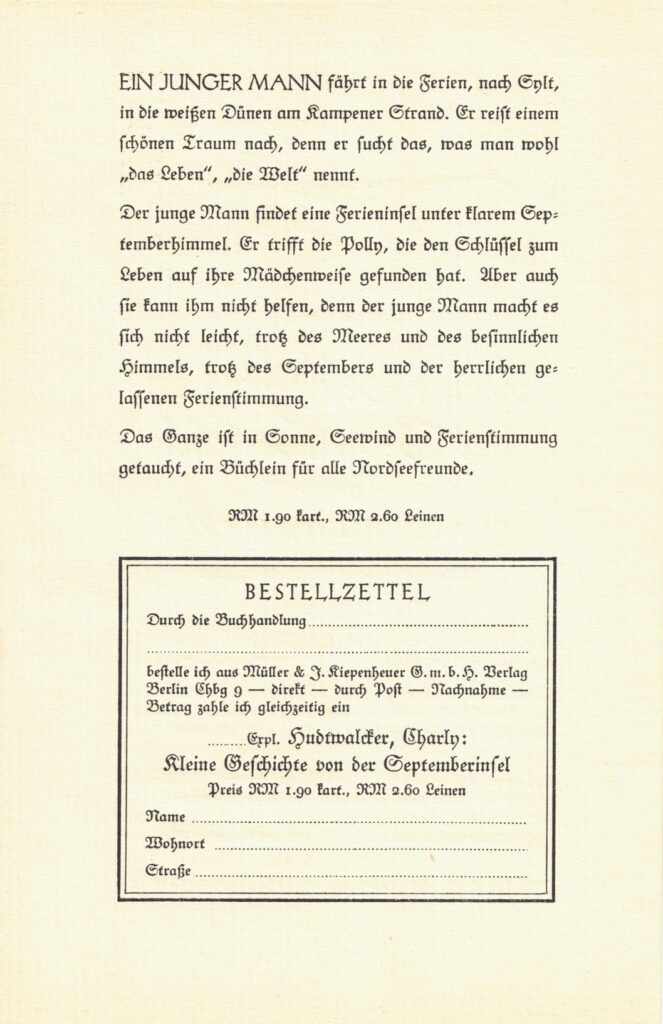A Different Voice
One afternoon during our last Christmas together, I sat in a couch in a hotel lobby reading. The weather outside was awful. A cold wind blowing wet things around. Bending trees, creating waves almost big enough to bring down the cliffs on the island off the north-German coast where we were. You could feel it coming right at you when somebody opened the entrance door. There was a glass of beer on the table in front of me, used matches in the ashtray. The book I read had come out the same fall and had obtained excellent reviews. It was pleasant enough to read, especially in this kind of weather, but a far shot from The Great Gatsby. A new F. Scott-Fitzgerald was not to be. Something in modern life dodged the written word. An overwhelming complexity together with a sense of direction lost hard to pen down. Nothing new about that, however. I merely had to catch a glimpse on the titles in my father’s bookshelf to see You Can’t Go Home Again by the erupting volcano of an author, Thomas Wolfe.

In my childhood home there were few rooms but many books in my father’s bookshelves. All of Thomas Wolfe’s works. Hemingway too. Various editions of his classics. Collected letters. Biographies. Jorge Luis Borges was everywhere. In German, in English. In my father’s study, in the living room, beside my father’s bed. Many years ago he had written articles on Borges for the Norwegian newspaper, Verdens Gang, as well as things for other newspapers too. Before that he had written two books: Kleine Geschichte von der Septemberinsel, published in 1935, and Walfang, published in 1937. The first was a collection of shorter stories from the German island, Sylt, the latter an expanded and re-worked text of his doctor dissertation at the University of Munich, Germany.
On the following pages are my father’s diary notes on his travel with the German artist Rolf Nesch to Lofoten in northern Norway in 1936. They are a miniature road-movie where an economical use of words tries to catch the wild scenery and fishermen used to hard work under though conditions. It is a world of people with values moulded out off strenuous labour and the unpredictability of the seas, people who could tell stories, real stories, stories of great catches, cods bigger than ever imagined, of storms and strange characters not encountered on the streets of a big European city like Hamburg. Like many young men, my father also eagerly used his camera. Added to his text are some of the photos he took. Together they form an historical documentation of Rolf Nesch’s visit to Lofoten, an experience which had a great and renewing impact on his work. Sparsely populated with few tourists, Rolf Nesch may have been the first, or one of the very few, European artists able to experience Lofoten in its former glory. 10 years later, Hitler had burned the houses and torched the old way of living.
Back at the time of their expedition up north, Rolf Nesch was 43 years old, my father 24. Both were Germans, coming from Hamburg. Both disgusted by the Nazi Regime and both about to take their first careful footsteps on Norwegian soil, their new homeland. At the early days of Nesch’s Norwegian sojourn, my father had moved in with Rolf Nesch and his wife in the house they rented outside of Oslo. Art was discussed, probably women too, jazz music played on the gramophone, wine shared. The diary notes were my father’s first writings in Norwegian. They were also to be the longest. The inclination to write had to be pushed aside. Whatever voice inside, it had to learn to wait. Hamburg called. The message was crystal clear: Above all other things stood the obligations to the family company. The death of his older brother, Heinrich Dierk (1904–1931), had been the sound of the bell summoning my father to duty in a service which was to last a lifetime. My father became a business man selling Cod Liver Oil to the four corners of the world. But if you were to judge his character, or form any opinion of him, by looking at the books beside his bed, you’d be hard up for guesses. Always at least three or four books piled up there, the titles revealed a different voice: The Correspondence Of Flaubert and Turgenjew, André Malraux’s Hôtes de Passage. Saul Bellow’s The Dean’s December was replaced by Love In The Time Of The Cholera by Gabriel Garcia Marquez. And Borges, of course, always Borges. In his later years another kind of books appeared beside his bed. No more huge volumes. Thomas Wolfe came to rest in the bookshelf. Gathering dust, until I, as a youngster, started tearing them apart. The newcomers were different. Thin books with short titles. Titles like Poems and Other Poems. I did some sneaking. Opened them, had a look. Most of the poems were short. Scratching my head, twisting my mind: Why read this stuff? If more than two stanzas you’d read each stanza before you could count to ten. What was the message? One single word said more than a dozen.

Some years earlier, on a summer’s day, my father and I had walked through the park. The subject of literature came up. My father asked the question how an author became an author. What made a person write? There’s a darker edge to that question: How to feed a family? Bourgeois worries, no doubt. But I was fed-up with bohemian life-styles. No need for any repetition. A long time ago, my father had been down that road too. In the 1930-ties. In Munich, Germany, during his student days at the University. A couple of years later Hitler would pack the culture of “old Europe” off to concentration camps and feed the remains to the canons. By the time he committed suicide in 1942, Stefan Zweig had seen it coming.
However, on this beautiful and sunny day, almost 50 years after Stefan Zweig published his autobiography, Die Welt von Gestern, my father and I walked through the park. The light came in from the west, the only sound heard except our voices where from the soles of our shoes against the gravel on the narrow path leading through flower beds and bushes. None of us in any hurry. Some moments you forget the instant they are over, others stay for the rest of your life. You’ll find out when they’re gone. But at rare occasions, you’ll know they’ll never come again even when you are in the midst of them. It can be the way the sunlight falls on a face. It can be a certain smile. Or spoken words. Maybe even the sound of shoes against gravel. Inspiration comes from unknown quarters, but is some kind of additional action required to ignite it grand style? A crazy and cheating wife? Alcohol and drugs serving as Viagra for the creative spirit? The candle of life ablaze like a bazooka, burning wildly at both ends. Down and out in Paris, lonely as a stray dog. A kinky mistress or two to get the creative fluids boiling? Not necessarily. Things could be relatively straight too. Hermann Hesse had even lived in Switzerland. To my father, Narciss and Goldmund, was more than a book. With its archetypical conflict between the man of the world, Goldmund, and the calmer and serious Narciss, preferring the meditative life of the cloister, the book was a dear friend, a life companion. We left the park and walked down a street towards the golden rays of the setting sun. I said I had read somewhere Raymond Chandler saying that if one had it within, it would come out. A matter of time. My father gave me a bemused look, said laughing:
“I can’t wait for my time to come!”
He was 77-years old.
For decades my father took the same tram to work every morning, the same tram back again. Lunch at the office was sandwiches prepared at home in the mornings. Weekdays as week-ends, he woke early and did gymnastics in the living room while listening to the radio. Spring, summer and autumn Sundays were used hiking in the woods. In wintertime skiing. Taking a taxi was an unheard luxury. Better freeze to death waiting for public communication. My father did not have a driver’s licence. Cars estranged you to the surroundings. The speed of cars was not the pace of life. People had survived for thousands of years without. The ancient Greek did not drive to Acropolis. Balzac never saw one. The classics had all been written without the sound of burning rubber disturbing street life. The mere thought of Michelangelo behind the steering-wheel of a Porsche was enough to realize there had been no David. Those who thought cars had improved quality of life were sidetracked on the surface of things, their standards of measurements inadequate and unreliable. People came all kinds and sizes. The person standing right beside you could be light-years away. On the surface people were living similar lives within the same framework of routines, underneath age and time were highly individual parameters. Businessmen were all about here and now. They were not aiming at the moon. With artists you never knew. Artists were either the nobility of mankind or on the brink of insanity. And then there was the matter of paying the price. Even solitude came at a cost.

The weather was not letting up. We’d been holed up inside the hotel all day and it was soon time for dinner. Into my second beer, I looked up from the book and saw my father coming. Even in this half-empty hotel, a hot spot in summer but a lousy deal in winter, with the few guests floating through the corridors like silent shadows, pretending they were not really there unless by mistake, my father in his blue blazer, white shirt and tie, could have entered right into the dining hall at some posh five star hotel in Nice. He looked on the cover of the book I was reading, said in a strong and emotional voice not often heard:
“The novel is dead.”
The serious urgency of his voice matched the weather outside. None of them cared about whatever reviews.
My father was not good at small-talk. He never made any high-brow attempts claiming to solve the problems of the world either. Talking was a difficult task, with age even increasingly so. Instead he developed the skill of having others talk to him, and to listen. Something in the way my father held his head as he listened, told me he silently measured every word against the tapestry of experience. No stranger to human nature, he had walked on broken glass and knew what people could be up to. Being alive was being aware. Hemingway said smoking ruined your ability to sense the smells. Eat with pleasure, drink with pleasure, make love with pleasure. Whatever you do, don’t do it half-heartedly. Although man himself was not immortal, some values were timeless. Like vanity. Like dignity. On this side of paradise, you were the gardener.


Contrary to the way the death sentence of novels were handed out, his words were mostly cautiously delivered in simple yet complex sentences, sentences open for interpretation, sentences aiming wider than the present. By the look on his face you saw him consider and re-consider the words within. When he spoke, a shade of shyness appeared on his face. It was like the burden of having to say something he knew was important was a huge responsibility. Words had to be found which delivered only the essence of things. Words were the wax the soul placed its seal upon. My father was a man of the world with the secret dreams of a hermit.
John Michael Hudtwalcker, December 2006
www.hudtwalcker.com 2014
